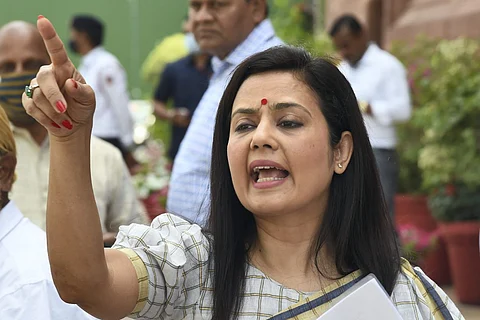

Lashing out at the Union government for blocking links to the BBC documentary on the 2002 Gujarat riots and Prime Minister Narendra Modi, Trinamool Congress MP Mahua Moitra shared several links to sites where the video can still be accessed. Sharing a link to the digital library Internet Archive where the documentary was previously available and has since been taken down, Mahua tweeted: “Sorry, haven’t been elected to represent the world's largest democracy to accept censorship. Here’s the link. Watch it while you can.” She also shared links to the documentary on video sharing platform Vimeo and the messenger app Telegram on Tuesday, January 24.
Several other Twitter users have also continued to share links to YouTube and other alternative platforms where the documentary titled India: The Modi Question can still be accessed, and many such tweets sharing the YouTube link have been taken down by Twitter. “Get the point: What @BBC show proves or disproves is up to viewers to decide. But Govt of India’s raging censorship actions are unacceptable,” Mahua tweeted on Monday, January 23.
The Union government had on January 20 directed social media platforms Twitter and YouTube to block links to the documentary. The Ministry of External Affairs called the documentary a "propaganda piece" that “lacks objectivity” and reflects a “colonial mindset.”
This link works in Telegram with audiohttps://t.co/HFmbdUl0JN
— Mahua Moitra (@MahuaMoitra) January 24, 2023
Here’s a new link that works.
— Mahua Moitra (@MahuaMoitra) January 24, 2023
Good, bad, or ugly - we decide. Govt doesn’t tell us what to watch.#BanCensorshiphttps://t.co/jYy57ymOyl
The link has been removed though my tweet is untouched. pic.twitter.com/o6Ixu2d30H
— Mahua Moitra (@MahuaMoitra) January 24, 2023
Twitter links of citizens blocked by Govt for sharing @BBC report. @derekobrienmp & @pbhushan1 on it . My link is still up.
— Mahua Moitra (@MahuaMoitra) January 22, 2023
सच कहना अगर बगावत है तो समझो हम भी बागी हैं pic.twitter.com/2lcwy9Soyb
In directing Twitter and YouTube to remove links to the documentary, the Government of India exercised its emergency powers under Rule 16 of Information Technology (Intermediary Guidelines and Digital Media Ethics Code) Rules, 2021, which have been challenged by news organisations, digital rights activists and social media platforms for enabling censorship. This is the first time the IT Rules have been invoked to target a major international broadcaster.
Over fifty tweets have been taken down for sharing YouTube links to the documentary, including tweets by TMC MP Derek O’Brien, Supreme Court advocate Prashant Bhushan and American actor and political activist John Cusack, using the government’s emergency powers under Rule 16 of the IT Rules to block information “in case of emergency.” Under this rule, content can be removed without giving the publishers an opportunity to make their case.
Digital rights organisation Internet Freedom Foundation (IFF) has pointed out that Rule 16 (3) of the IT Rules requires an 'authorised officer' to place the request to ban certain information before a review committee to decide whether the ban must continue. It asked the 'authorised officer' – the chairperson of the inter-ministerial committee under the three-tier mechanism established under the IT Rules, 2021 – to comply and for the review committee to make its findings public.
The Union government has told YouTube and Twitter to take down fresh links to the documentary if someone uploads or tweets them again, sources told PTI. However, opposition parties have opposed the move and alleged that the documentary has ‘exposed’ Modi. A Supreme Court-appointed investigation found no evidence of wrongdoing by PM Modi, who was Chief Minister of Gujarat when the riots broke out in February 2002.
With PTI inputs